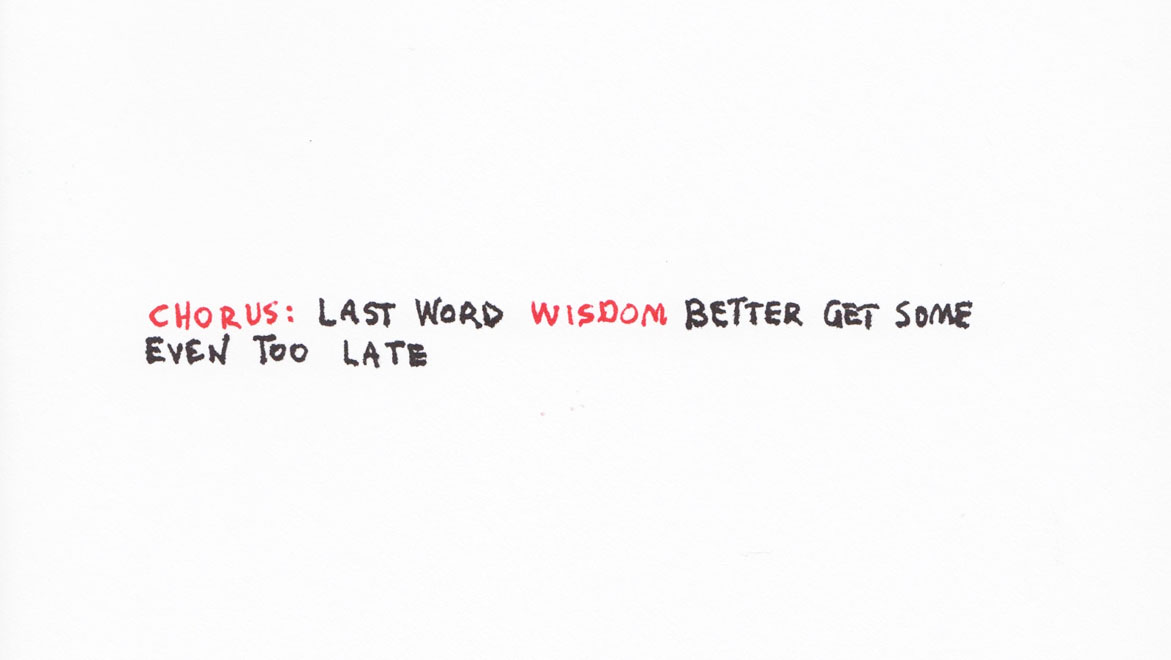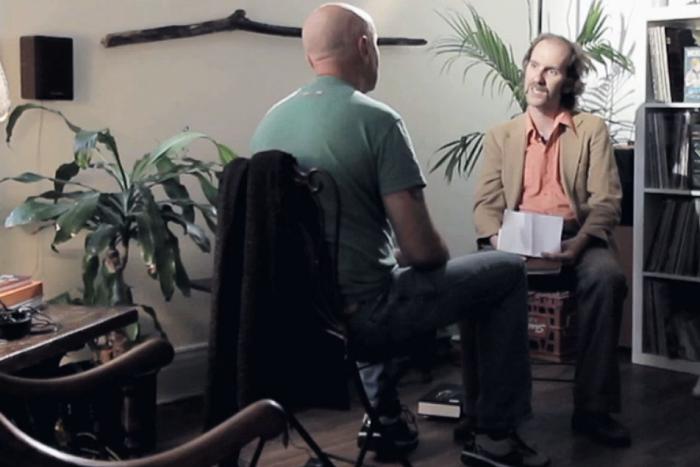Antigonick is Anne Carson’s postmodern retelling of Sophocles’ fifth century BC play Antigone, a tragedy set in Thebes. In Carson’s version, the tragedy happens largely because of bad civic governance. Basically, Thebes has a terrible mayor.
One way we can tell that the mayor, Kreon, is terrible is that he almost never speaks in complete sentences. Carson has slashed all of his major monologues, notable in the original version of the play for their eloquence, down to just the verbs, or sometimes just the nouns. So Kreon’s opening speech reads: “Here are Kreon’s Verbs for Today/ Adjudicate Legislate/ Scandalize/ Capitalize/ Here are Kreon’s Nouns/ Men/ Reason/ Treason/ Death/ Ship of State/ Mine.” Kreon later rebuts the objection that “Mine isn’t a noun” by saying, “It is if you capitalize it.”
The other way we know Kreon is a terrible mayor is that he sentences a young woman, Antigone, to be buried alive because she has given her dead brother a funeral. At this point I should mention that Kreon is technically a dictator.
For the past six years, I have lived in twenty-first century Toronto. (Before that, I was in Vancouver and still stuck in the nineties, clothing-wise at least.) As I write this, Toronto’s mayor, Rob Ford, is in court on a conflict-of-interest charge that could see him kicked out of office. Neither I nor anyone I know would be very sad about this if it happened. I am watching the courtroom Twitter updates the way a cat watches birds. So it is perhaps not surprising that when I tried Carson’s slashing technique for myself—yes, of course I tried Carson’s slashing technique for myself—I turned first to our man of the hour.
Ford’s monologues may not be known for their eloquence, but they do tend to attract attention. Earlier this year, Ford articulated his position on gun criminals in the wake of a fatal shooting in Scarborough. Distilled to its key verbs, Ford’s view becomes: “Go/ Get out/ Don’t want/ Go/ Don’t want/ Don’t know/ Sit down/ Get out/ Don’t want.” Ford’s position on transit is already practically all nouns, and so barely stands to benefit from the technique, but nevertheless: “People/ Subways/ Subways/ Subways/ Subways/ Subways.” (I have to confess that someone has beaten me to the punch and made a video version of this.)
Of course, Carson’s technique could be used to make anyone sound ridiculous. Worried I was being unfair, I tried it with a quote from Ontario Premier Dalton McGuinty. The results were less than totally satisfying. Speaking to reporters about the same gun criminals mentioned above, McGuinty emitted the following meditative series of nouns: “Table/ questions/ table/ solution.”
The similarities between Kreon and Rob Ford did not end with their flair for delightfully truncatable speech. I also noted a resemblance between their approaches to conflict resolution. “Enemy is always enemy/ Alive or dead,” says Kreon, explaining why Antigone’s brother can’t be buried. It's a phrase that might lend insight into why Ford has maintained such a longstanding vendetta against Toronto Star newspaper reporters—even, at one point, charging at one of them in on public property adjacent to his home. And it’s the only reason, as far as I can guess, that Ford would spend significant sums of money to take already-built bike lanes away from the city’s cyclists.
There is also the attitude to expert advice. In the play, Teiresias, a seer with a surprisingly good track record of predicting the future, advises Kreon that burying people alive while their dead relatives remain above ground is a bad idea. (It occurs to me that predictions may not have been all that hard to make in ancient Thebes.) Kreon accuses him of being a fake, a profiteer, and an “entrepreneur.”
Rob Ford has similarly sneered at the opinions of the informed. If we substitute Teiresias with the panel of transit experts who proposed useful expansions to Toronto’s transit system; and “burying people alive” with the Sheppard Avenue subway line Ford has insisted on building anyway, well—you get the picture. Incidentally, in one scene of Antigonick, Kreon is spotted “rowing his new powerboat,” suggesting to me that Thebes is at least as much in need of realistic transit planning as Toronto is.
As I turned the pages—Antigonick, like most of Anne Carson’s work, is easy to devour—I sacreligiously began to wonder whether Bianca Stone’s beautiful, translucent drawings were the right choice to illustrate the volume after all. What if somebody had, instead, sculpted Kreon in butter?
Carson’s insight into the modern civic condition goes beyond skewering lousy leadership, however, so it seems a shame to dwell too long on Ford and his ancient predecessor. I have often thought that the wonderfully surreal advice routinely blasted over Toronto transit system loudspeakers—in which you, the “customer,” are admonished to move back for your own convenience, or to exit the subway using “all the available doors”—deserved poetic treatment, and so I was pleased to see Carson create her own magic with the word “customer.”
“Many terribly quiet customers exist but none more/ Terribly quiet than man,” begins one of the book’s more oddly moving and provocative passages. “His footsteps pass so perilously soft across the sea/ In marble winter.” The text is illustrated with a picture of a decadent looking cake abandoned in the path of a glacier. (Bianca, I take it back about the butter sculpture.)
Substitute “customers” with another word—“creatures,” “citizens,” “bots,” “passengers,” “predators,” etc.—and it is easy to see how profoundly that noun choice might affect one’s worldview. (It certainly affects the sound bite you might cull if you were grabbing only nouns.) But Carson is concerned here not so much with satirizing the word “customer” as with stretching it to the limits of its profundity. If this is the word we have for ourselves, then let’s use it to say the important things, the passage suggests.
In a similar vein, if “Go/ Get out/ Don’t want/ Go/ Don’t want/ Don’t know/ Sit down/ Get out/ Don’t want” is the language of current political discourse, then let’s put it to good use. At least, I hope that’s what the court says.






